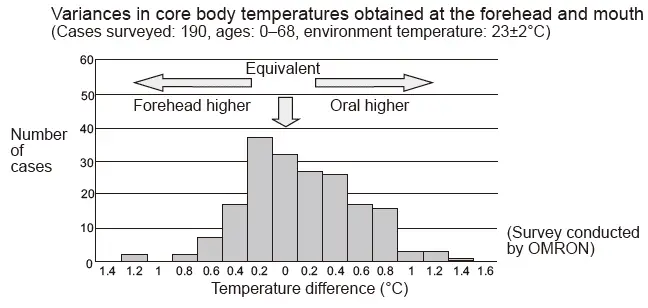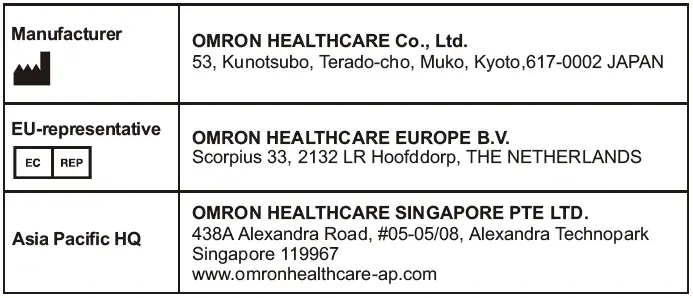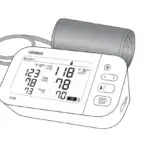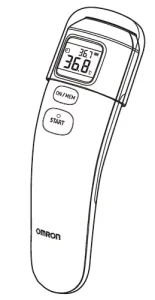
INSTRUCTION MANUAL
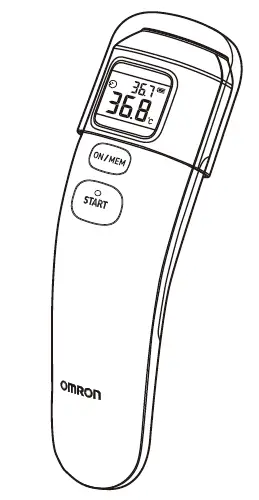
Forehead Thermometer
Model: MC-720
Thank you very much for purchasing the Forehead Thermometer. Be sure to read this Instruction Manual thoroughly before use. Keep this Instruction Manual at hand for future reference.
Thank you for purchasing the OMRON Forehead Thermometer MC-720.
Intended Use:
The OMRON Forehead Thermometer MC-720 offers safe, comfortable and quick temperature measurement from the forehead. It is mainly designed for household use.
Please read this instruction manual thoroughly before using this unit. Please keep for future reference. For specific information about your own temperature, CONSULT YOUR DOCTOR.
Important Safety Information
To assure correct use of the product, basic safety measures should always be followed, including the precautions listed below.
Warning: The following situations are potentially hazardous and, if not avoided, could result in death or serious injury.
- Conducting self-diagnosis based on the measurement results and/or treatment can be dangerous. Please follow the instructions of your doctor. Self-diagnosis may worsen the symptoms.
- A high or prolonged fever requires medical attention, especially for young children. Please contact your doctor.
- Keep the unit out of children’s reach.
- If a child swallows the battery, immediately consult with a doctor.
- Do not throw batteries into a fire. The battery may explode.
- Remove the battery when the unit will not be used for three months or more. Failure to do so may lead to fluid leakage, heat generation or bursting, resulting in damage to the unit.
- Do not use the unit to measure any item with a temperature higher than 80.0°C (176.0°F).
General Precautions
- Do not apply a strong shock to, drop, step on, or vibrate the main unit.
- Do not use a mobile phone near the unit.
- The main unit is not waterproof. Be careful when handling this unit so that no liquid (alcohol, water, or hot water) will get into the main unit. When the unit is wet with vapor, wait until it dries or wipe it lightly with a soft dry cloth.
- Do not disassemble, repair, or modify the unit.
- When the probe lens becomes dirty, wipe it lightly with a soft dry cloth or a cotton swab. Do not wipe the probe lens with tissue paper or a paper towel. For details, refer to section 4.3.
- If there is any temperature difference between the places where the unit is stored and where you are going to measure, leave the unit in the room where you are going to use it for more than 30 minutes to allow it to reach room temperature first, then measure.
1.Overview
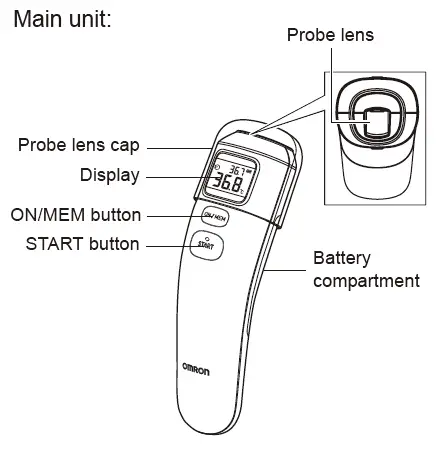
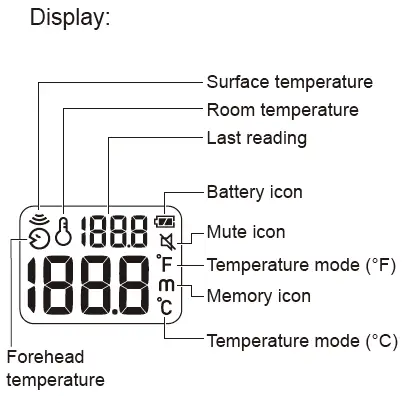
2. Preparation
2.1 Removing the Insulating Tape
When using the unit for the first time, pull the insulating tape out of the battery compartment.
The unit is turned on and after 1 minute the room temperature
appears on the display.
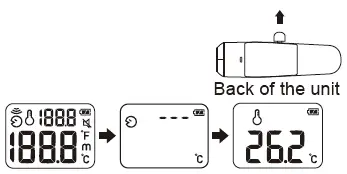
Notes:
• The room temperature remains on the display even after the unit turns off.
• Place the unit on a level surface, in a place that is at room temperature (away from direct sunlight or air conditioning, etc.).
2.2 Switching between °C and °F
This unit is set in °C as default.
- While the room temperature is displayed, press and hold the START button.
- While holding it down, press and hold the ON/MEM button until °F appears on the display with two beeps.
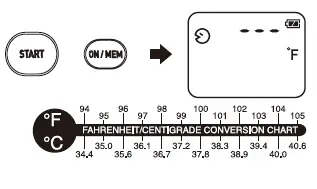
Notes:
• To select °C mode again, start from step1.
• When the unit is switched between °C and °F, all the readings stored in the memory are deleted.
2. Preparation
2.3 Setting the Buzzer
The buzzer is activated by default, but can be deactivated.
Note: The buzzer is only available in forehead measurement mode.
- Press the ON/MEM button to turn on the unit.
- Press and hold the ON/MEM button for 3 seconds.
The ” Buzzer ” icon flashes on the display.
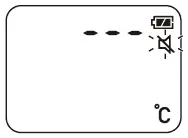
3. Release the ON/MEM button.
The ” Buzzer ” icon remains lit and the buzzer is deactivated.
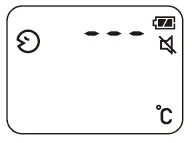
Notes:
- • If the ON/MEM button is pressed down for more than 5 seconds after the ” Buzzer ” icon starts flashing, the unit turns off without deactivating the buzzer.
- • To activate the buzzer again, start from step1.
3. Using the Unit
3.1 Taking a Reading
Forehead Measurement Mode
This mode displays the oral-equivalent value of the measured forehead temperature.
Always make sure the probe lens is clean and undamaged, and the forehead is clean with no sweat, cosmetics, scars, etc.
Prior to measurement, ensure that the patient has not taken a bath or exercised within the last 30 minutes, and has remained in a stable environment for at least 5 minutes. It is recommended to perform measurement three times. If the three measurements are different, select the highest temperature.
- Pull off the probe lens cap to remove it.
- Press the ON/MEM button.
All indicators appear on the display for 1 second. Then the display shown on the far right appears with two beeps.
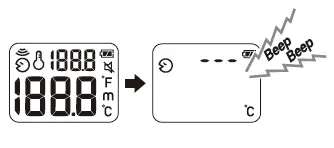
3. Hold the unit with the probe lens 1 to 3 cm away from the center of the forehead.
Notes:
- Holding the unit too long in the hand may cause a higher ambient temperature reading of the probe. This could make the body temperature measurement lower than usual.
- Keep still during measurement.

4. Press the START button.
The measurement is complete in 1 second with a long beep.
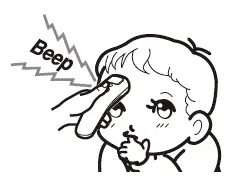
5. Move the unit away from the forehead and check the measurement result.
The display lights up for 5 seconds.
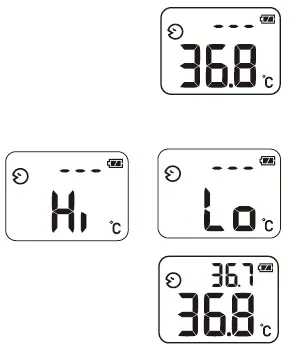
Notes:
- If the result is higher than 42.2°C (108.0°F), “Hi” appears on the display. If the result is lower than 34.0°C (93.2°F), “Lo” appears on the display.
- You can take another measurement after the display light turns off with two beeps. Make sure the ” ” icon remains lit.
- After the second measurement, the first measurement is displayed in the top right corner, while the second is displayed in the center.
6. Press and hold the ON/MEM button until “OFF” appears on the display to turn off the unit.
The unit stores the measurement in memory, then turns off with the room temperature on the display. The unit also turns off automatically if no operation is performed for 1 minute.
Surface Measurement Mode
Surface measurement mode shows the actual and unadjusted surface temperature of an object, which is different from the body temperature. This mode can help you determine if the object temperature is suitable for a patient or baby (such as baby milk). The unit is set to forehead measurement mode as default. Follow the steps below to switch to surface measurement mode.
- Press the ON/MEM button to turn on the unit.
- Press and hold the ON/MEM button. While holding it down, press the START button.
The ” SCAN ” icon appears on the display.

3. Move the unit close to the object and press the START button.
It measures continuously until the START button is released.

Notes:
- Move the probe lens as close to the object as possible when using in surface measurement mode (1 cm apart is recommended). Do not apply the probe lens to the object directly.Surface measurement mode shows the surface result. The surface and internal temperature may be different. Make sure it is safe when measuring an object with extremely high or low temperature.
- The display does not light up and the buzzer is off when using this mode.
- To switch to forehead measurement mode, go back to step 2 and make sure the icon changes to the icon.
- The unit automatically turns off if no operation is performed for 1 minute with the room temperature on the display. To manually turn off the unit, you can press and hold the ON/MEM button until “OFF” appears on the display.
- Surface measurement mode is not intended for body temperature measurement or medical use.
3.2 Using the Memory Function
This unit automatically stores the last 25 measurement results (excluding Hi/Lo results).
Notes:
- If the memory is full, the unit will delete the oldest reading.
- When the unit is switched between °C and °F, all the readings stored in the memory are deleted.
- Press the ON/MEM button to turn on the unit.
- Press the ON/MEM button again.
The memory number appears on the display
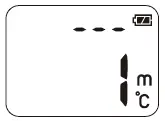
3. Release the ON/MEM button.
The most recent result appears on the display.
Press the ON/MEM button repeatedly to view the older results.
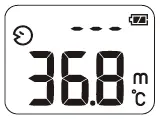
4. Press and hold the ON/MEM button until “OFF” appears on the display to
turn off the unit.
The unit turns off with the room temperature on the display.
4. Troubleshooting and Maintenance
4.1 The Icons and Error Messages
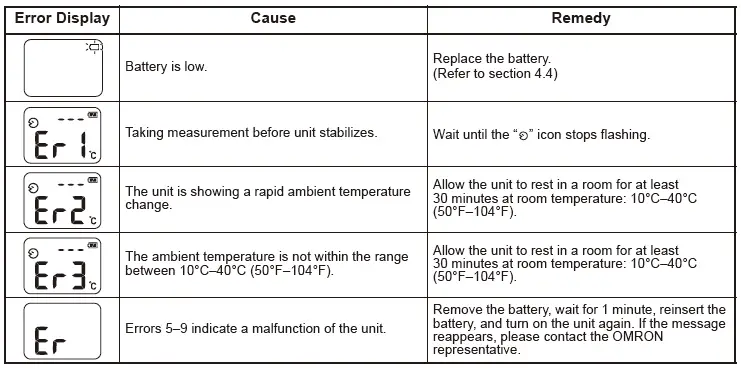

4.2 Questions and Answers
- The temperature indicated is rather high.
- The unit has been stored in a cold room. When the unit has been stored in a cold room, the measured temperature may be rather high if you measure the temperature shortly after bringing the unit to a room that is at normal temperature. Measure temperature after leaving the unit for 30 minutes in the room where it will be used. It is advisable to store the unit in the room where you are going to measure temperature.
- The probe lens has been exposed to direct sunlight.
- Measurement was taken shortly after the subject cried. Crying can increase facial temperature.
2. The temperature indicated is rather low.
- The body is sweaty. Do not use the unit when wet after swimming, bathing, or through sweating after physical exercise, as skin temperature may have fallen. Wipe away moisture and allow 30 minutes for the body to acclimatize to room temperature before measuring.
- The probe lens is dirty.
- Measurement was taken in surface temperature mode. Use forehead measurement mode.
- Measurement was taken shortly after the subject was outdoors in cold weather. Wait until the forehead has warmed up.
- Measurement was taken at a location other than the forehead. Be sure to measure exactly at the forehead, not surrounding areas such as the hairline.
3. There are variances in the measurement values.
- Measurements were not taken at the same location.
- The probe lens is dirty.
4. The temperature measured on this unit is not equivalent to oral-temperature.
- Forehead thermometers may not always calculate the exact oral-equivalent value. It is recommended to take regular measurements on subjects such as family members, etc., who are in good physical condition, to know their normal temperature.
4.3 Maintenance
• Check the unit if it is dropped. If unsure, please contact your local OMRON representative to have your unit checked.
• When the probe lens becomes dirty, wipe it lightly with a soft dry cloth or a cotton swab. Do not wipe the probe lens with tissue paper or a paper towel.
• Clean the probe lens carefully to avoid damaging it.
– Use a 70% alcohol swab or soft cotton moistened with 70% alcohol to clean the probe lens.
– Allow the probe lens to fully dry for at least 1 minute.
• Do not store the unit in the following types of places. Doing so may damage the unit.
– Wet locations.
– Locations with high heat and humidity or those that are exposed to direct sunlight. Areas close to heating equipment, dusty locations, or environments where there are high salt concentrations in the air.
-Locations where the unit will be subjected to leaning over, falling, shock, or vibration.
-Pharmaceutical storage areas or locations where corrosive gases are present.
4.4 Replacing the Battery
Battery: CR2032 lithium button battery
Note: To protect the environment, discard the used batteries in accordance with the local regulations regarding waste disposal procedure.
- Release the screw and remove the battery cover.
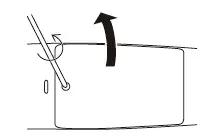
2. Remove the battery with a pointed object.
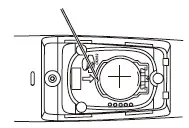
Note: Do not use a metal tool as it may damage the surrounding parts.
3. Insert the new battery under the metal hook on the right side and press the left side of the battery down until it clicks.
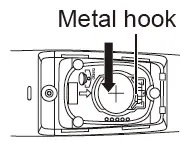
Note: Replace the new battery with the plus (+) side on the top.
4. Close the battery cover and tighten the screw.
5. Technical Data
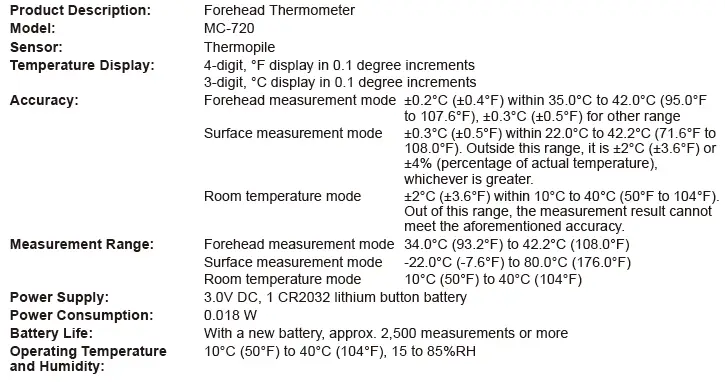

Notes:
- The specification may be changed without prior notice.
- This OMRON product is produced under the strict quality system of OMRON HEALTHCARE Co. Ltd., Japan.
- This unit fulfills the provisions of the EC directive 93/42/EEC (Medical Device Directive) and the European Standard EN ISO 80601-2-56:2012: Particular requirements for basic safety and essential performance of clinical thermometers for body temperature measurement.
Important information regarding Electro Magnetic Compatibility (EMC)
With the increased number of electronic devices such as PC’s and mobile (cellular) telephones, medical devices in use may be susceptible to electromagnetic interference from other devices. Electromagnetic interference may result in incorrect operation of the medical device and create a potentially unsafe situation.
Medical devices should also not interfere with other devices. In order to regulate the requirements for EMC (Electro Magnetic Compatibility) with the aim to prevent unsafe product situations, the EN60601-1-2 standard has been
implemented. This standard defines the levels of immunity to electromagnetic interferences as well as maximum levels of electromagnetic emissions for medical devices. This medical device manufactured by OMRON HEALTHCARE conforms to this EN60601-1-2:2007 standard for both immunity and emissions.
Nevertheless, special precautions need to be observed:
• Do not use mobile (cellular) telephones and other devices, which generate strong electrical or electromagnetic fields, near the medical device. This may result in incorrect operation of the unit and create a potentially unsafe situation. Recommendation is to keep a minimum distance of 7 m. Verify correct operation of the device in case the distance is shorter.
Further documentation in accordance with EN60601-1-2:2007 is available at OMRON HEALTHCARE EUROPE at the address mentioned in this instruction manual.
Documentation is also available at www.omron-healthcare.com.
Correct Disposal of This Product (Waste Electrical & Electronic Equipment)
This marking shown on the product or its literature, indicates that it should not be disposed with other household wastes at the end of its working life. To
prevent possible harm to the environment or human health from uncontrolled waste disposal, please separate this from other types of wastes and recycle it
responsibly to promote the sustainable reuse of material resources.
Household users should contact either the retailer where they purchased this product, or their local government office, for details of where and how they
can take this item for environmentally safe recycling.
Business users should contact their supplier and check the terms and conditions of the purchase contract. This product should not be mixed with other
commercial wastes for disposal.
Disposal of used batteries should be carried out in accordance with the national regulations for the disposal of batteries.
6. Some Useful Information
How the Forehead Thermometer MC-720 Works
This unit measures the temperature at the surface of the forehead by sensing infrared emission of the skin at the measured point, and then calculates the oral-equivalent value using a unique algorithm based on actual body temperature survey data.
About Body Temperature
Body temperature refers to the stable temperature of the inner body (also known as core body temperature). While temperature measurements at the armpit or mouth provides surface temperature values, holding the thermometer steadily at the measurement point for approx. 10 minutes provides a temperature measurement more closely representing that of core body temperature.
Since forehead temperature measurement involves no bodily support of the thermometer, the resulting measured temperature is typically lower than that of the armpit or mouth.
However, since the forehead has blood vessels that are much less prone to vascular constriction (a natural function of body temperature adjustment), it is supposedly a better measurement area for determining core body temperature, even in a lower
temperature environment. By contrast, temperature measured at the arm or leg, for example, is not a suitable gauge of core body temperature, since such body areas are more subject to vascular constriction. (Note that temperature measured at the forehead may still be influenced by other conditions, such as sweating, or wind from
an air conditioner, etc. It is therefore advised to perform measurement in as stable an environment as possible.)
When measuring the temperature of an infant, note that infant body temperature is generally higher than adult body temperature and easily affected by external factors. For example, body temperature tends to increase after nursing or crying. Therefore, it is recommended to take measurements with the infant in calm and normal condition.
Temperature differences between body temperature and forehead temperature
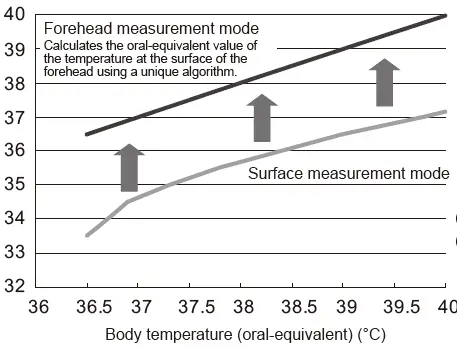
This unit measures the temperature at the surface of the forehead by sensing infrared emission of the skin at the measured point, and then calculates the oral-equivalent value using a unique algorithm (forehead measurement mode) based on actual body temperature survey data.
Knowing One’s Normal Temperature In order to make a correct judgment of suspected fever conditions, it is important to know one’s normal temperature.
Normal temperature varies with the individual and also changes depending on the time through a day. In addition, measured body temperatures may vary depending on the thermometer or the body part where you measure (see the graph “Variances in core body temperatures obtained at the forehead and mouth”). To find out one’s normal temperature, therefore, we recommend performing regular measurements under the following conditions:
- Measure with the same thermometer.
- Measure at the same area.
- Measure at the same time of day.
